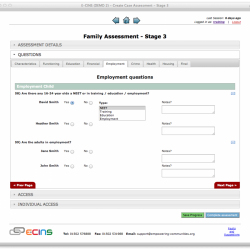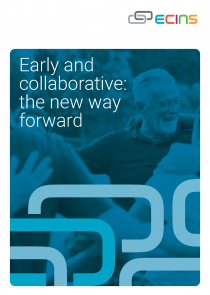The process of creating an assessment is quick and simple. When an assessment is started it automatically ‘pulls through’ the family members you have previously identified. This speeds up the assessment process and, once completed, you set your access permissions so that you can decide who can see the assessment and who can not. You can then set yourself a review date and duplicate the assessment at a later date. In addition to saving practitioners time it also puts in place a valuable benchmarking process that provides critical information for management to take forward.
ECINS Electronic Family Assessment Key Features:
- Teams can create their own bespoke assessment template from a bank of questions
- The bank of questions is made up of both objective and subjective questions
- Partnerships from around the country and all participating counties can submit questions to be included in the ‘questions bank’
- Stats and management reports can be generated from the assessment Assessments can be saved as work in progress
- Practitioners can task other teams and practitioners from the assessment for information they require to complete the assessment
- Completed assessments can be duplicated to speed up the completion of second and subsequent assessments
- When starting a new assessment family members are automatically pulled through to the assessment, this speeds up the assessment process and helps with some of the answers and management reports
- Once completed access permission can be applied to the assessment to restrict access to it if required
- The electronic assessment can be completed at the families address saving a considerable amount of time
- Reduces the need to use paper assessments
- The assessment framework can be adapted for other areas of business such as domestic abuse
- Review dates can be set on the assessment so that practitioners receive an email reminder
Initial feedback has been positive with practitioners stating that the assessment can also be used for families that are not part of the Troubled Families initiative and for other areas of business such as domestic abuse.
One of the key advantages of the Family Assessment Tool is the considerable amount of time it saves practitioners and key workers including Troubled Families Co-ordinators. Usual practice, until now, has been for assessments to be carried out in a paper-based format which needs to be filled in by hand. The new electronic version is linked directly to the relevant ECINS Cases and Profiles so that all the information on an individual and family is in one place and can be ‘pulled’ from the system with minimum effort.
The fact that the tool is accessible over a secure network means that the assessment can be carried out at the families’ address – practitioners can literally tap in the information whilst the meeting is in progress and set a future date to carry out a review. Because the information from the previous assessment is already there it enables the practitioner to quickly duplicate the previous assessment and make detailed progress comparisons against each review date.
Once the assessment or assessments have been created, all authorised practitioners within the scheme, who have been granted permission to view it, are able to see the completed assessment. By recording data over a set timeframe and comparing results Troubled Families co-ordinators are able to build a wider picture of the issues facing families and the correlations between them. It also helps key workers to analyse and understand the type of support that works for individual families and to generate a wide range of statistics that will help workers analyse trends and measure the effectiveness of their work with the family.
ECINS Founder and CEO, Gary Pettengell, said “ECINS has a very different way of supporting the Troubled Families Agenda. It is much more than just a bespoke Troubled Families software programme developed specifically for Troubled Families Co-ordinators. Instead it is a complete neighbourhood management solution that enables organisations to fully support their local troubled families initiative and any number of additional functions, saving everyone a considerable amount of time and money.
For example, Suffolk originally commissioned ECINS just for their Anti-Social Behaviour programme. They are now managing their troubled families countywide via the ECINS platform.
Because Suffolk bought the system to manage ASB across county they are able to use it to manage any other areas of business at no extra cost. That means that the usefulness and lifespan of ECINS goes well beyond the lifespan of the Troubled Families Programme which ends in 2015 and its use continues to grow with changing times and needs.
There are no limits to the amount of information that can be uploaded to the system, no limits to the number of users who can access it, there are no user licence fees at all. Quite literally its potential to an organisation sees no bounds and the time and efficiency savings are huge.”
Whilst ECINS is a complete neighbourhood management tool, rather than a bespoke solution to one problem, the system incorporates a variety of tools such as the Family Assessment which enables practitioners to tailor the system to suit specific issues.
A major advantage Suffolk has found in using ECINS is that the data uploaded by an organisation can be fully utilised across departments and partner agencies.
Effectively this means that because they were already using ECINS for other issues the task of identifying troubled families within their districts was made so much easier. Many of the individuals were already known to key workers and, as such, had an existing profile on ECINS. Where interventions had already been put in place with some of the individuals they were able to share that information fully with external partners and agencies. Information, such as support individuals were already receiving, was already accessible on ECINS for everyone (with access permission) to see.


